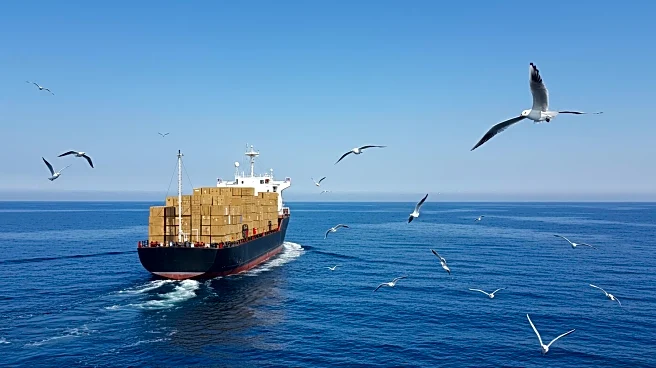What is the story about?
What's Happening?
A humanitarian aid shipment organized by Cyprus is currently delayed offshore near the port of Ashdod, Israel. The vessel, Henke, a Turkish-owned cargo ship, is carrying 1,200 tons of relief supplies intended for Gaza. The shipment includes contributions from Cyprus, Malta, and various humanitarian organizations from the United States, Italy, Malta, and Kuwait. The United Arab Emirates played a significant role in the effort. The supplies, including food and essential materials, are to be distributed by World Central Kitchen under the United Nations delivery mechanism. Despite Israeli customs screening the shipment, the vessel has been circling offshore for 48 hours, awaiting permission to dock.
Why It's Important?
The delay in delivering humanitarian aid to Gaza highlights the ongoing challenges in providing relief to the region, which has been severely affected by conflict. The shipment is crucial for the residents of Gaza, where over 15,000 people have been injured and at least 2,000 have died trying to access aid since May. The involvement of multiple countries and organizations underscores the international community's commitment to addressing the humanitarian crisis. However, the delay raises concerns about the effectiveness of aid delivery mechanisms and the political complexities involved in accessing conflict zones.
What's Next?
The ship is expected to dock once clearance is granted, allowing the distribution of aid to proceed. The situation remains tense as ceasefire talks and hostage release negotiations continue between Israel and Hamas. The international community is likely to monitor the situation closely, with potential diplomatic efforts to ensure the safe and timely delivery of aid. The outcome of these efforts could influence future humanitarian missions and the broader geopolitical dynamics in the region.
Beyond the Headlines
The delay in aid delivery may have deeper implications for international relations and humanitarian policies. It highlights the ethical and logistical challenges of providing aid in conflict zones, where political and security concerns can impede relief efforts. The situation also raises questions about the role of international organizations and governments in ensuring the protection and welfare of civilians in war-torn areas.















